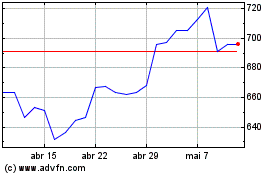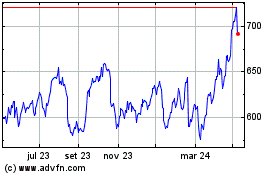Hong Kong Stocks Tumble, Leading Regional Markets Lower -- Update
22 Maio 2020 - 3:22AM
Dow Jones News
By Chong Koh Ping
Hong Kong shares plunged, leading regional declines, after China
signaled it will impose new national-security laws on the city.
By early afternoon Friday in Hong Kong, the Hang Seng Index had
lost 5.6%, with property, financial and infrastructure stocks
retreating between 5% and 9%.
The Hang Seng's decline put it on course for its worst day since
July 2015, Refinitiv Datastream data showed. Its biggest drop
during the market turmoil earlier this year came on March 23, when
it fell 4.9%. HSBC Holdings PLC dropped 4.7% on Friday, broadly in
line with the wider pullback.
Other major stock benchmarks in the Asia-Pacific region dropped
less steeply, tracking U.S. declines on Thursday. Japan's Nikkei
225 and Australia's benchmark S&P/ASX 200 traded 0.9% lower.
South Korea's Kospi Composite and the Shanghai Composite fell 1.6%
and 2% respectively.
E-mini S&P 500 futures fell 0.8%.
New security restrictions could further undermine the
Western-style rule of law and freedoms that have underpinned Hong
Kong's role as a global financial center.
President Trump said details on Beijing's plans aren't yet known
and promised to "address that issue very strongly" if China
proceeds. U.S. senators said they were introducing a bipartisan
bill that would sanction Chinese officials and entities who enforce
the new national-security laws in Hong Kong, and penalize banks
that do business with the entities.
Jim McCafferty, joint head of Asia-Pacific equity research at
Nomura in Hong Kong, said the coronavirus pandemic meant the city
had been relatively quiet in recent months after months of
antigovernment protests.
"Any attempts by China to become more assertive will cause some
flashpoints locally," he said, and could help stoke broader
geopolitical tension.
Ankit Khandelwal, chief investment officer at Maitri Asset
Management, said markets were caught between poor economic data and
U.S.-China tensions on one side, and governments' economic support
measures on the other. "The tension between the U.S. and China
might dictate the near-term movements of the markets," he said.
On Friday, Chinese Premier Li Keqiang, speaking at the opening
of an annual gathering of lawmakers, said the government wouldn't
set an economic target for 2020, pointing to the coronavirus and
uncertainties around trade.
Mr. Li detailed bond programs totaling 4.75 trillion yuan ($667
billion) to help fund China's recovery from the coronavirus. The
proceeds will be channeled to local governments to help boost
employment, consumption and investment.
"This is very different from in the past," when Chinese stimulus
didn't go directly into local governments' coffers, said Chaoping
Zhu, a Shanghai-based global market strategist at J.P. Morgan Asset
Management. "This means there will be more money to support local
employment and livelihoods and to support the local economy."
However, Mr. Zhu said the measures had disappointed some Chinese
investors, since it meant less capital would flow into shares and
property. "The government is not in a hurry to have a new round of
very aggressive stimulus measures. Pumping in a lot of money will
cause property prices to rise sharply again," he said.
The yield on the 10-year U.S. Treasury note fell to 0.650% on
Friday in Asia, from 0.677%. Yields move inversely to bond
prices.
Brent crude, the global oil benchmark, fell 3.8% to $34.68 a
barrel.
Write to Chong Koh Ping at chong.kohping@wsj.com
(END) Dow Jones Newswires
May 22, 2020 02:07 ET (06:07 GMT)
Copyright (c) 2020 Dow Jones & Company, Inc.
Hsbc (LSE:HSBA)
Gráfico Histórico do Ativo
De Mar 2024 até Abr 2024

Hsbc (LSE:HSBA)
Gráfico Histórico do Ativo
De Abr 2023 até Abr 2024
